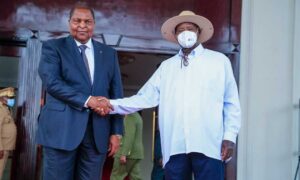Corruption in Uganda: A Growing Concern
Former Leader of Opposition in Parliament, Prof. Ogenga Latigo, has underscored the urgent need for President Yoweri Museveni to build new transparent systems at all levels to tackle the pervasive corruption in Uganda. Latigo highlights that the current level of corruption in Museveni’s administration is too substantial to address by targeting individual leaders alone.
Corruption’s Pervasiveness in Museveni’s Administration
Latigo asserts that the extent of corruption within Museveni’s administration is so widespread that eliminating corrupt leaders would mean dismantling the entire administration. This statement follows President Museveni’s recent announcement to take stringent actions against corrupt leaders who hinder the economy and service delivery.
The Need for a National Dialogue
“It is too big for him,” Latigo states. He elaborates that in his district of Agago, funds meant for roads have been diverted by district officials and leaders, contracts are awarded but remain uncompleted, and this issue persists across every district and subcounty in Uganda. Latigo calls for a national dialogue on corruption, emphasizing the need for a fresh start that involves speaking to all stakeholders, including the opposition.
Too Late to Fight Corruption?
Latigo believes it may be too late to combat corruption under the current framework of the National Resistance Movement (NRM) leadership. He suggests that the entrenched corruption requires more than just surface-level reforms.
Calls for Comprehensive Audits
John Musala, the Member of Parliament for Bubulo East County, concurs with Latigo on the need for systemic changes. Musala recommends that the president should conduct comprehensive audits of all institutions to identify and eliminate corrupt officials at all levels. He emphasizes that fighting corruption is a collective responsibility.
Historical Context and Responsibility
Musala reflects on Uganda’s history of dictatorships in the 1970s, 1980s, and 1990s, noting that the current degenerated state is not solely Museveni’s fault. He stresses the importance of individual responsibility, particularly among the youth, in rectifying the situation.
Learning from Global Examples
Latigo mentions historical examples to illustrate the severity of the situation. He references Jerry Rawlings of Ghana, who took drastic measures against corrupt politicians, significantly altering the political landscape in Ghana. Latigo suggests that Uganda needs a similar paradigm shift to effectively combat corrupt.
In conclusion , the fight against corruption in Uganda requires more than just rhetoric. It demands a comprehensive overhaul of the current systems and active participation from all sectors of society. Prof. Ogenga Latigo’s call for new transparent systems and a national dialogue underscores the critical need for immediate and decisive action to curb the corruption that hinders Uganda’s progress.



























